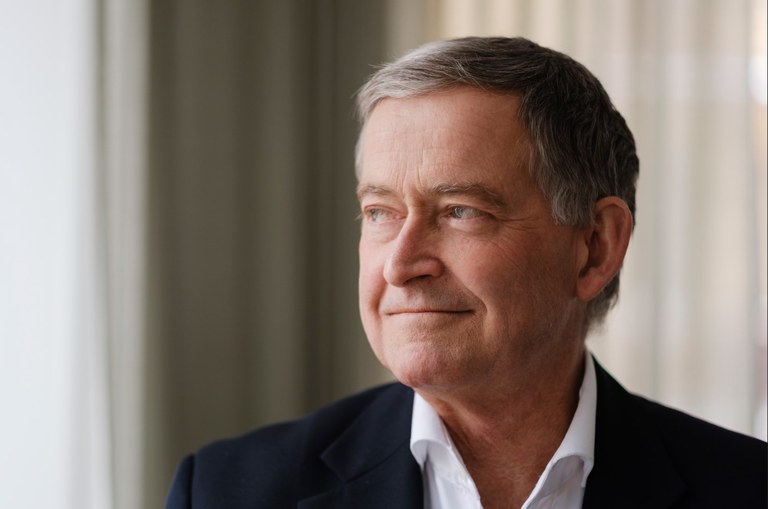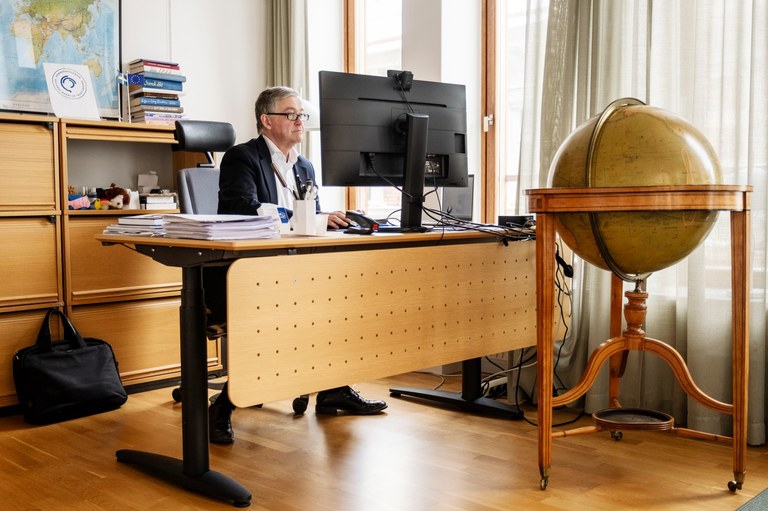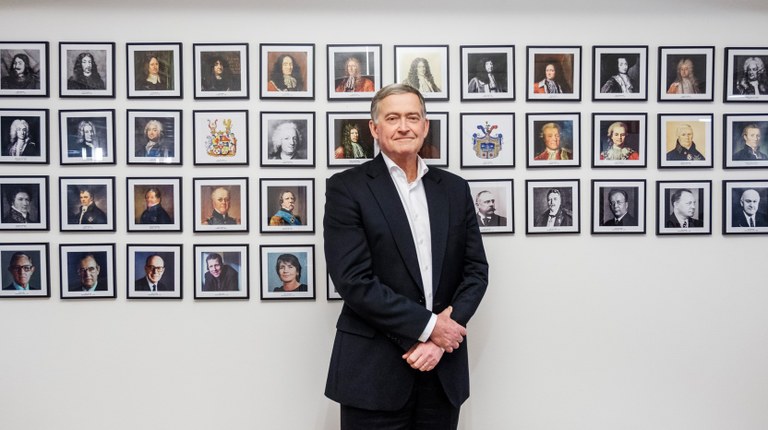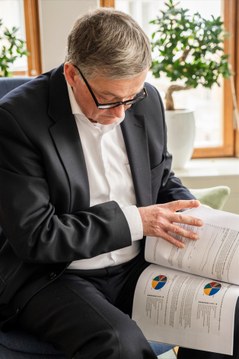Nordic Freedom of Movement Council gears up to banish border barriers
The Nordic region aims to be the world’s most sustainable and integrated region by 2030. To achieve that, we need to change gears, facilitate trade and focus on removing the remaining border barriers, says Anders Ahnlid, the new Swedish representative on the Nordic Freedom of Movement Council.
During the Swedish Presidency of the Nordic Council of Ministers, Anders Ahnlid is also the man in charge of the Freedom of Movement Council.
“I was very pleased when I was asked to represent Sweden on the Freedom of Movement Council. It allows me to help make it easier for people and companies to operate across the Nordic region. I believe I have a lot to offer and I have good colleagues to help me in this work,” he says.
Ahnlid is also the Director General for the National Board of Trade, one of Sweden’s oldest authorities which was founded by Queen Kristina in 1651. On his office wall hangs the historic first instruction, neatly handwritten, hinting at what 400 years of trade has meant for Sweden and the alliances that have been forged over the centuries.
Trade policy a common thread
Anders Ahnlid says his road to becoming a representative on the Freedom of Movement Council has been long and winding. His first job after graduating was at the National Board of Trade. Then followed 35 years at the Ministry for Foreign Affairs, including as OECD and EU ambassador.

He also served as ambassador to Finland for four years. Trade policy has always been a central part of his work, and he says Nordic trade policy cooperation has been extensive both before and after Sweden's EU membership.
Through his work, he sees how border barriers can cause issues, but also that a lot can be resolved. The National Board of Trade has Solvit, the EU's equivalent of the Freedom of Movement Council, which helps individual citizens when they have issues with the four freedoms.
One example is fishmonger Rönnbäcks Fisk i Pajala who wanted to sell fish in Finland but was denied due to different food regulations. With the help of Solvit, the problem was resolved and the fishmonger now sells his fish also in Finland, which was crucial for the survival of his business.
A priority issue during the Swedish Presidency
Anders Ahnlid’s job at the Freedom of Movement Council is still quite fresh. The Council’s mandate is to facilitate the freedom of movement for people and companies in the Nordic region, remove barriers to freedom of movement and solve issues together with politicians and civil servants.
When his role was announced, the Swedish Minister for Nordic Cooperation Jessica Roswall highlighted the importance of accelerating the work of removing border barriers. She said this was important for reaching the vision of the Nordic region becoming the world’s most integrated and sustainable region by 2030.
“This is a priority issue for the government, not least during the upcoming Swedish Presidency of the Nordic Council of Ministers,” said Jessica Roswall in a press release on 27 September 2023.
So what does it mean when the Freedom of Movement Council wants to change gears?
"We want to anchor the need for integration among the Nordic countries on a political level so that it becomes more than just grand words in speeches. It is important for this to be a political priority so that our work on border barriers can result in concrete solutions and we get the issues solved," says Anders Ahnlid.
Important trade partners
The Nordic countries are key trade partners, and this is especially important for Sweden. For Ahnild, improving the free movement of people, goods and services has been and remains central to his work, and will now get even more attention at the Freedom of Movement Council.
Trade with the other Nordic countries makes up 25 per cent of Swedish. Norway is Sweden’s largest export market alongside Germany. All the Nordic countries engage in a significant amount of trade with each other, but for Sweden, this is extra important. Sweden's trade with the rest of the Nordics surpasses that of any of the other countries. Together, the Nordic countries with their 27 million citizens make up the fifth largest economy in Europe.

“It is very good that all five Nordic countries are members of the EU common market, including Norway and Iceland through the EEA agreement. But Norway and Iceland are not part of the customs union and this creates challenges like the long lorry queues we still get at the Svinesund bridge border crossing,” says Ander Ahnlid.
He took up his position as Director General at the National Board of Trade in 2020 and saw up close the setbacks in Nordic integration that followed in the wake of the pandemic.
With his Nordic perspective, he commissioned the report Stronger Integration and Enhanced Free Movement in the Nordic Region. Published in March 2022, it examines what is needed to create stronger Nordic integration.
The Nordic Freedom of Movement Council also recently published the report Working Across the Nordic Countries, which proposes a simplification of tax rules to improve mobility, making it easier to work remotely also for border commuters.
The pandemic challenged Nordic integration
The report was commissioned when the usual mobility within the Nordic region was severely challenged during the pandemic. Suddenly it was no longer possible to freely cross borders. Many who were employed in a different country were suddenly forced to stay and work from home and ran into major problems.
“Very early on, the pandemic showed how costly it can become when you deal with these issues in different ways. It had big consequences. The pandemic itself was very bad of course, but the silver lining I believe is that it became clearer to us that we have to cooperate to solve our problems together."
The Freedom of Movement Council have four formal meetings a year and is made up of ten representatives from all of the Nordic countries, the autonomous areas, the Nordic Council of Ministers and the Nordic Council.

It has been operating since 2014 and has a mandate from 2022 identifying five priority areas: taxes, digitalisation, statistics, pensions and population registration.
According to this mandate, the Council will also solve five to eight border barriers a year in the areas of labour market, social issues, education and business, as well as working towards a harmonisation of the four areas. The politicians will create a new mandate in 2024. This is a good and efficient way of working, believes Anders Ahnlid.
“It is important that we view integration in a broader perspective, which is why identifying these areas is key to avoid getting stuck in details. The aim, after all, is to help governments and to reach the prime ministers’ vision of the Nordic region as the world’s most sustainable and integrated region by 2030. We need support from the ministers responsible to move forward,” says Anders Ahnlid.
The Freedom of Movement Council can draw on information from services that often identify specific border barriers. The Council members cooperate with government ministers in the respective countries, national authorities and parliamentarians. They also keep in touch with people on the operational level to solve problems directly with those who handle them.
“This work has been going on for a long time and we have made good progress. But the tax rules for people living in one country and working in another clearly remain challenging and unnecessarily complex. There would be great benefits if we could simplify things for these people,” says Anders Ahnlid.

There are many examples that show how much remains to be done. Recently, Swedish Radio reexamined third-country citizens’ rights to work in a different Nordic country. Jobseekers in Malmö are sought-after in Copenhagen and want to commute to the Danish labour market.
Since third-country citizens have permission to stay in only one single country, the freedom of movement between Nordic countries does not cover them. This issue has been raised in the Freedom of Movement Council but has not yet been solved.
“This is a very important issue. The Copenhagen area, or Greater Copenhagen which also covers Malmö, is a very dynamic area and a good region for cooperation. So you need to make use of the available workforce and third-country citizens should also be given the opportunity to contribute,” he says.
Nordic cooperation when introducing EU rules
Anders Ahnlid would also like to see cooperation between the Nordics when they introduce EU rules that apply to all of them.
“We ought to ask ourselves whether we could collectively introduce the rules, and always consider how the new rules relate to our Nordic neighbours. We must all adhere to the rules covering the EU common market, but within their framework, one region could take the lead and show how to improve integration. The Nordics could spearhead this,” says Anders Ahnlid.
He believes the pandemic and today’s turbulent world could increase the desire for cooperation in the Nordics.
“We are also about to enter into the same defence union for the first time in hundreds of years. Nordic defence cooperation has developed in recent years, but we can go even further when we all join the same Nato family. And the stronger we are economically thanks to an integrated Nordic region, the better we will become at defending our freedom,” says Anders Ahnlid.
 Follow us on Facebook
Follow us on Facebook
